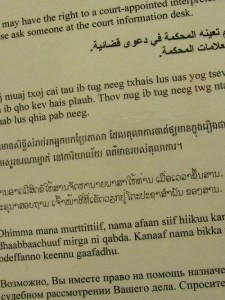 As Minnesota becomes more complex and diverse, administration of justice necessitates people having access to language-appropriate legal resources. For instance, Minnesota law provides that court interpreters be appointed for persons involved in criminal proceedings, property forfeitures or mental health commitments who cannot speak or comprehend the English language. (See Minn. Stat. §§ 611.30 to 611.34.) But the process of making law multilingual is never easy or complete. Both the Minnesota Statutes and Court Rules are only released in English, which means any translation of them risks compromising their intended meaning. The MN Courts website is also only available in English, even though its Self-Help Center offers limited access language links in Spanish, Hmong, and Somali. Certain court forms are available in additional languages including Cambodian, Lao, Oromo, Russian and Vietnamese. (Note: The forms themselves must be completed in English, and court interpreters cannot help with this.)
As Minnesota becomes more complex and diverse, administration of justice necessitates people having access to language-appropriate legal resources. For instance, Minnesota law provides that court interpreters be appointed for persons involved in criminal proceedings, property forfeitures or mental health commitments who cannot speak or comprehend the English language. (See Minn. Stat. §§ 611.30 to 611.34.) But the process of making law multilingual is never easy or complete. Both the Minnesota Statutes and Court Rules are only released in English, which means any translation of them risks compromising their intended meaning. The MN Courts website is also only available in English, even though its Self-Help Center offers limited access language links in Spanish, Hmong, and Somali. Certain court forms are available in additional languages including Cambodian, Lao, Oromo, Russian and Vietnamese. (Note: The forms themselves must be completed in English, and court interpreters cannot help with this.)
For other non-English self-help options, LawHelpMN offers their helpful legal information resources in varying degrees in a number of languages. Brochures for SMRLS (Southern Minnesota Regional Legal Services) state that they offer interpreters for their patrons that speak Hmong, Laotian, Somali, Russian and Spanish. Speaking of self-help, do you know someone who is interested in attending our weekly Housing and Conciliation Court clinic but needs an interpreter to communicate with the lawyer? Contact us the week before they plan to attend so that we can arrange an interpreter. Do you know someone who doesn’t speak English well but has an upcoming appearance in district court? Or does your own district court case depends on testimony from your dear grandmother who doesn’t speak English? In these cases, contact the district court clerk ahead of time so that they can arrange a court interpreter. (Fluent or not, your cousin cannot serve as granny’s court interpreter.) There is no cost for this service.
Are you a judge or an attorney handling a new case that might possibly call for an interpreter? Additional resources to help you are available at this page, including an interpreter jury trial guide and handy “bench card” guides specifically for judges. Here you can also find referrals to the appropriate court rules regarding the appointment of interpreters in court. (Ex: See MN Rules Civ. Pro 43.07) You may also want to be aware of the Code of Professional Responsibilty for Interpreters in the Minnesota Court System.
Are you fluent in another language and interested in becoming a court interpreter? Read about the Minnesota Court Interpreter Program to learn how to get started!
This comment has been removed by a blog administrator.
This is an exciting detail to learn about the late Judge Loevenger! For more information on his life, you might wish to contact the Minnesota State Historical Society. http://sites.mnhs.org/support/